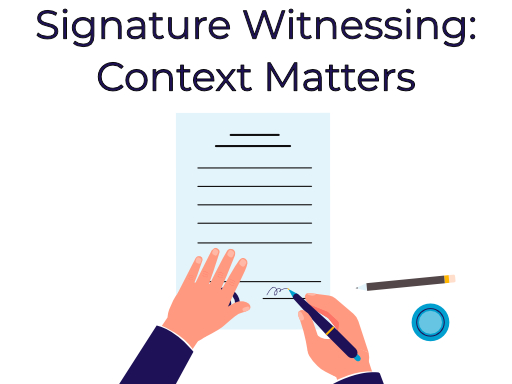Notary Public Underwriters Blog
Signature Witnessing: Context Matters
- Details
- Published: April 26, 2021

“Notaries witness signatures.”
That’s the number-one answer most people give when asked, “What is the function of a notary public?”
Well indeed, notaries witness signatures! But the context in which they do so dictates which actions are required of them.
Context 1: A document requiring the principal signer’s acknowledgment is presented for notarization but not yet signed.
- When a document requires a principal signer’s acknowledgment, the signer acknowledges to the notary that he or she signed the document voluntarily and with understanding of the signed document’s effects.
Only when the notarial act to be performed is an acknowledgment, a document may be presented to the notary already signed, or unsigned. Standard notarial certificate language for an acknowledgment makes no reference to the signature being made before the notary. It does state that the signature was acknowledged before the notary.
If the document presented for an acknowledgment is not already signed, the signer must sign it in order to acknowledge their signature in the notary’s presence. In this context, the notary will personally witness (observe) the document being signed, then take the signer’s acknowledgment.
Context 2: The document requires the principal signer’s oath or affirmation.
- When a document requires the principal signer’s oath or affirmation*, the signer will swear or affirm to the notary that the contents of the document are true or correct. The signer’s signature must always be made in the notary’s presence, because this act’s standard notarial certificate language states that it was.
_______________
*NOTE: In some states, oaths/affirmations involving the signing of a document are called “verifications.”
Even if the document requiring an oath or affirmation is already signed and the signature appears to be that of the principal signer, the notary must personally witness (observe) the signer’s act of signing their signature. So, the signer must sign it again in the notary’s presence.
Acknowledgments and oaths/affirmations represent the great majority of notarial acts performed in America each day. But there’s a third notarial act, authorized in a growing number of states, that provides the third context in which a notary might “witness signature.”
Context 3: The document requires the authorized notarial act of “signature witnessing.”
- Yes… some states specifically authorize the notarial act of “signature witnessing” (also called “attesting signatures”). When a notary performs the notarial act of signature witnessing, the notary performs all the steps of notarization required for acknowledgments and oaths/affirmations, minus the formality of the principal signer making a statement to the notary about his or her/their signature or about the truth of information in the document.
This is an important difference between witnessing a signature related to an acknowledgment or oath/affirmation, and the signature witnessing notarial act. The notarial certificate for an acknowledgment or oath/affirmation indicates that the principal signer made a statement or assertion in the notary’s presence about the circumstances of the document signing… the signer either acknowledges the signature is theirs and it was made voluntarily; or the signer swears or affirms that the contents of the signed document are true or correct.
The notarial act of signature witnessing requires no such statement or assertion from the principal signer. The notarial certificate for this act simply states that the signer’s signature was made in the notary’s presence.
So remember, “witnessing a signature” means something different depending on the context. Apply this knowledge to help you notarize safely and knowledgeably out there!
This article highlighted differences between certain authorized notarial acts, all of which are evidenced by their own notarial certificate language. Every notary’s toolkit should include notarial certificates pads or stamps, for use when a document’s certificate language is missing or must be amended to comply with the notary’s state law. Visit our Notary Supplies Shop to purchase yours today!
